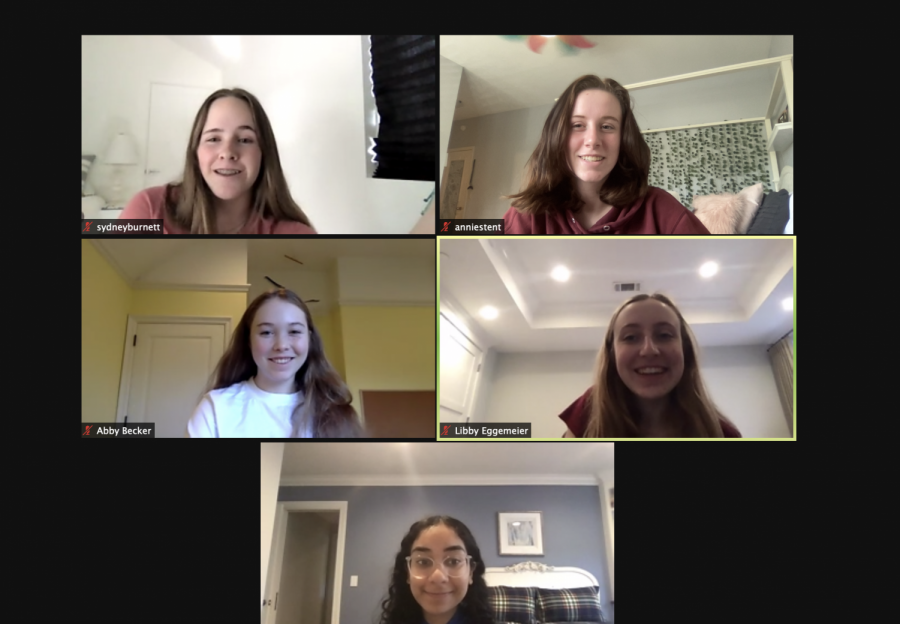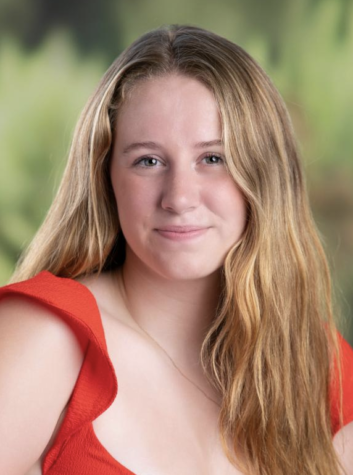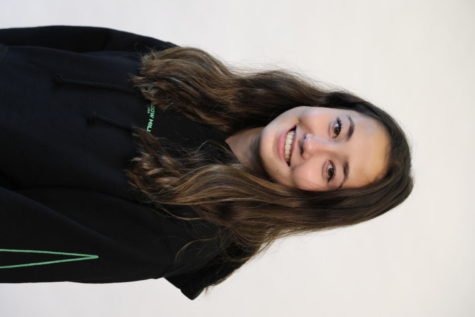Restorative Justice Advocate Helps Menlo Students Make an Impact
CRI’s Menlo student volunteers meet to discuss plans for the organization. Staff photo: Annie Stent.
January 15, 2021
Collette Carroll is the founder of the California Reentry Institute (CRI), an organization that provides pre-release and post-release programs for incarcerated men at San Quentin State Prison. The majority of her CRI team are volunteers, including multiple Menlo students and alumni.
Formerly incarcerated men who go through CRI work with surrogate victims to help them take personal accountability for their crimes. This allows the men to interact with people who were victims of a crime similar to the one that they committed, instead of their personal victims, to fully understand the impact that they made, according to Carroll. CRI also focuses on separating the person from their crime because shame is a primary cause of recidivism (the tendency of a convicted criminal to reoffend), according to Carroll.
CRI volunteers meet the men shortly after they are released from prison, supporting them with new clothing and groceries, as well as affordable housing and a career plan.
Carroll started volunteering in San Quentin 20 years ago. Eight years into taking part in one of San Quentin’s multiple different pre-release programs, Carroll had enough experience with criminal justice to realize that the program was insufficient.“I knew that the program that we were doing was good, but it wasn’t doing as much as it needed to be doing,” Carroll said.
Carroll decided that there needed to be an updated program that did more for the men. She knew that starting an organization like this would be time consuming, so she originally planned on having someone else start CRI. After that plan did not work out, she decided to take it upon herself. It has now been 13 years since Carroll founded CRI, and she continues to develop plans to keep growing its programs.
CRI has multiple student volunteers who attend Menlo, including seniors Libby Eggemeier and Ishi Sood as well as sophomores Sydney Burnett, Abby Becker and Sydney Fish.
Eggemeier has been volunteering since she attended a workshop in May 2020 hosted by Carroll and Menlo alum Sonya Lebedeva (‘20). “I was so blown away by the personal stories of the men,” Eggemeier said.
Burnett and Fish started volunteering with CRI more recently. They both attended a workshop series with CRI in early November 2020. “I could tell [Carroll] has such a deep connection with all of the men. […] I knew I wanted to learn more about [CRI],” Burnett said.
It can be difficult for high school students to find volunteer positions where they feel like they are making an impact and are being heard. “[Carroll is] really interested in young people’s opinions, and that’s not something we see all the time,” Eggemeier said.
“I’m thrilled they even want to be involved,” Carroll said. For Carroll, one of the positives of having high school volunteers is a unique skill set that she is not very familiar with: social media. “They are more aware of what’s happening. […] They have everything at their fingertips. They get [criminal justice], even when many adults don’t get it,” she said.
“[Carroll is] devoting so much of her life to helping this cause,” Fish said.
For example, Carroll and CRI supported Martin Walters, a formerly incarcerated man, and helped him transition back to society after his term in San Quentin. Walters is a CRI graduate and was released from prison about six years ago. He is now CRI’s first paid employee and works as their Director of Programming and Expansion.
Walters’s first criminal offense was as a youth offender. He feels that if he had received the education on criminal justice and restorative justice that CRI’s high school volunteers are getting, he might not have gone down the same path that he did to end up in the prison systems. “You could save your friends from doing something to someone else [by volunteering with CRI and learning about criminal justice],” Walters said.
Carroll’s organization was able to turn Walters’s life around, and she hopes to be able to do the same for many more people outside of San Quentin.
CRI is working to expand slowly into all of California’s prisons and then into a few other states, according to Carroll. They also want to expand into juvenile prisons and women’s prisons.
In addition, CRI hopes to implement more preventative action, such as working with at-risk high school students. “We want to train staff not to cancel out kids that are truant or misbehaving or late. […] We want them to find out why,” Carroll said.
Carroll believes that her high school volunteers will be able to help with these goals. Due to age requirements in San Quentin, they cannot go inside to directly volunteer in the pre-release programs; however, she looks for their help in other ways. “To have their input on the world that they live in is invaluable, particularly if we want to be working with people in their age group,” Carroll said.
Carroll’s work at CRI is seemingly interminable with organizing pre-release programs, putting together the logistics of post-release for the men, fundraising and overseeing all of her volunteers. She feels that her high school volunteers make such an impact despite the limits on their hands-on work because of what they do behind the scenes. “What my high school volunteers do allows me to do what I need to do,” Carroll said.
Note: Staff writer Annie Stent also volunteers at CRI, which was not included in the text to avoid a conflict of interest.





